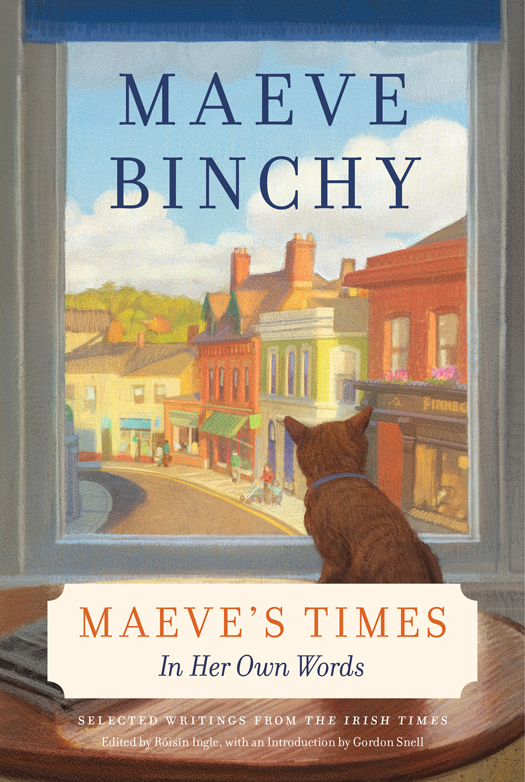
Maeve's Times
In Her Own Words
کتاب های مرتبط
- اطلاعات
- نقد و بررسی
- دیدگاه کاربران
نقد و بررسی

August 4, 2014
Binchy’s trademark warmth, humor, and humanity characterize this volume, which collects five decades of her reporting for the Irish Times (1960s–2000s). The wide-ranging topics reveal a journalist far more interested in people than places or events, though quiet references to IRA bombings, Thatcher’s Britain, the conflict in Cyprus, and second-wave feminism prove Binchy (Circle of Friends) was as savvy about politics she was about character. Wit, sarcasm, and big-heartedness emerge as hallmarks of Binchy’s “direct and uncluttered style.” Additionally, readers will enjoy her avid and unrestrained curiosity, the “wish to enter into other people’s lives,” which inspires her to eavesdrop on fellow diners, travelers, and passersby. “Wouldn’t you want to follow almost everyone home?” she remarks while observing people at a beach. While the collection makes an enjoyable read on the merit of humor alone, editor Ingle’s selections capture Binchy’s journalistic apprenticeship, record an intelligent woman’s perspective on a changing world, and offer entertaining glimpses of biography that Binchy fans will adore. Agent: Christine Green.

September 1, 2014
Newspaper pieces by a prolific novelist and playwright. Binchy (Chestnut Street, 2014, etc.) began her writing career as a journalist for the Irish Times, starting out as women's editor, from 1968 to 1973, and continuing as columnist, feature writer and reporter based in the newspaper's London office; in 1988, she resigned a full-time position but contributed regularly until her death in 2012. This selection of her work represents Binchy's eclectic interests, infectious sense of humor and wry take on social change. In early pieces, she reflected on her experiences as a waitress and choosing underwear in Australia. She didn't much like her body (she was always overweight) and compared herself to those more slender and well dressed. In 1976, she tried a week of self-improvement, following suggestions in a women's magazine, but failed to transform herself into one of the "new brand of unreal woman." Nevertheless, she was a successful writer, and she also gleefully reported on the doings of the royals. In 1973, she was at Westminster Abbey ("lit up like an operating theatre") for the wedding of Princess Anne to Mark Phillips, where Grace Kelly was among the guests, "staring into space, looking like she always looked, kind of immaculate." In 1981, her subjects were the fairy-tale couple, Charles and Diana. Binchy was not surprised when they separated in 1987: "[T]here were always aspects of the royal romance that spelled danger from the word go." She noticed that Sarah Ferguson, "a bit pudgy for a princess," was on a strict diet. Unable to attend, she watched Kate and William's wedding on TV: "I miss the magic of the English losing all their reserve," she noted ruefully. A bit intimidated by Samuel Beckett, she nevertheless produced an insightful portrait of her compatriot, with his "spikey hair" and "ludicrous energy." A blithe, entertaining collection that will surely delight Binchy's many fans.
COPYRIGHT(2014) Kirkus Reviews, ALL RIGHTS RESERVED.

August 1, 2014
As any reader of Binchy's novels (Tara Road; Chestnut Street) knows, the beloved--and successful--Irish writer could tell a story. She was doing that long before she ever wrote a novel; Binchy's letters home to her family from when she traveled abroad as a young teacher were so engaging, her husband explains in the book's foreword, that her father submitted them to the Irish Times, and they were published. This began a 50-year association with the newspaper, with Binchy contributing columns even after finding fame with her books. This warm, down-to-earth collection of her contributions is a best-of that is arranged chronologically in sections covering from the 1960s through the 2000s, and it works wonderfully. Fans of the author's novels will enjoy learning more about her early life and about an earlier Ireland. Very delightful is Binchy's familiar tendency to explore things that are not regularly discussed--mostly not because they are unmentionable, but because they're so ordinary that they're overlooked. In one piece, for example, she expresses relief that tights have been invented, while another investigates the various reasons why people hate the month of February. There are gentle laughs aplenty, which will be no surprise to fans. What may be a revelation is that the author also tackled some controversial and upsetting subjects. One column, for example, discusses the hard life faced by Irish people who must work in England, and another describes the journey undertaken by a young woman who is surprised at the humanity she finds when she travels to that country to have the abortion she can't get at home. VERDICT Fans of Binchy, as well as readers curious about Irish life over the years will savor this often-light read (but should be ready with the hanky at times).--Henrietta Verma, Library Journal
Copyright 2014 Library Journal, LLC Used with permission.

October 1, 2014
Readers who knew the prolific Binchy (19402012) through her extensive catalog of novels and story collections may imagine the author as a kindly Irish lady, albeit one adept at weaving the tumultuous lives of multiple characters into an enticing portrait of a cohesive village, in tune with issues of the day as well as their historic antecedents, and appreciative of the intricacies of both city and village life. So fans may be surprised to learn that this sensitivity to domestic drama, ear for dialogue, and eye for detail were honed during the years Binchy spent as a journalist for the Irish Times. Spanning five decades, this collection of Binchy's trademark columns celebrates her unabashed delight in the human condition, yes; but it also uncovers a much sharper wit and a more trenchant observer with a more cynical attitude than she ever divulged in her fiction. For the legions of fans who mourned her passing, this revelatory collection of essays brings a little of their cherished Maeve back, and then some.(Reprinted with permission of Booklist, copyright 2014, American Library Association.)

























دیدگاه کاربران